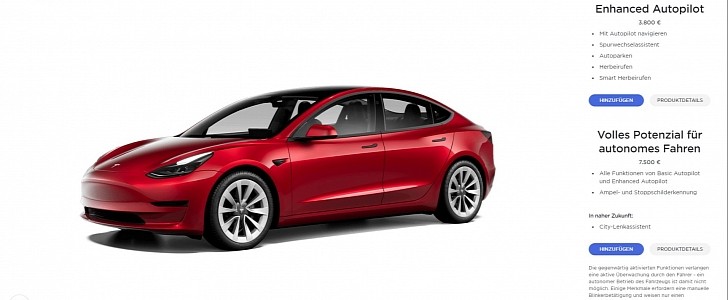Tesla scored a landmark victory after an appeals court reversed an earlier ruling to stop advertising the Autopilot and FSD in Germany. The lawsuit was filed in 2019 by the non-profit industry group Wettbewerbszentrale, which considered the formulations misleading.
Tesla is no stranger to lawsuits, and recently Elon Musk announced the company would significantly strengthen its legal department. “Tesla policy is never to give in to false claims, even if we would lose, and never to fight true claims, even if we would win,” wrote the outspoken CEO on Twitter two weeks ago. Tesla scored a big win in Germany, reversing a decision that seemed poised to haunt the EV maker in the country and possibly throughout the European Union.
Two years ago, the non-profit industry group Wettbewerbszentrale (Center for Combating Unfair Competition) sued Tesla for misleadingly use of the Autopilot and “full potential for autonomous driving” (FSD) formulations in its advertising materials and on its website. In July 2020, the Munich Regional Court ruled in Wettbewerbszentrale’s favor, without Tesla budging an inch from its course. Instead of gracefully accepting defeat, Tesla appealed the verdict.
The legal procedure has followed its course behind the scenes, as Teslamag has found. Tesla continued to use the same terms on its website and other marketing materials. At the same time, the legal trial advanced to the Higher Regional Court. The judgment was not previously known, as Teslamag only learned about Tesla’s victory last week.
According to the ruling, Tesla should refrain from promising autonomous driving features will become available “by the end of the year.” Following the verdict, Tesla updated its website to “in the near future” instead. Otherwise, the court rejected all the claims from Wettbewerbszentrale, which wanted to ban the use of terms such as Autopilot and FSD. The court was of the opinion that the descriptions on Tesla’s website are clear enough to avoid any misconception.
Moreover, the Higher Regional Court did not allow a revision of the judgment due to a lack of fundamental importance, so it was actually final. Wettbewerbszentrale later lodged a non-admission complaint with the Federal Court of Justice, which delayed the entry into force. The court dismissed the plaintiff’s complaint at the end of July, which cleared the way for Tesla to legally use the Autopilot and FSD terms in Germany.
Tesla’s victory is important for its operations in Europe. Nevertheless, Tesla faces a similar procedure in its home country. California DMV has accused Tesla of misleading customers by overpromising the capabilities of its two advanced driver assistance systems (Autopilot and FSD). According to the complaint, the DMV should “suspend or revoke Respondent’s manufacturer license,” no less. It remains to be seen whether this complaint has more chances of success.
Two years ago, the non-profit industry group Wettbewerbszentrale (Center for Combating Unfair Competition) sued Tesla for misleadingly use of the Autopilot and “full potential for autonomous driving” (FSD) formulations in its advertising materials and on its website. In July 2020, the Munich Regional Court ruled in Wettbewerbszentrale’s favor, without Tesla budging an inch from its course. Instead of gracefully accepting defeat, Tesla appealed the verdict.
The legal procedure has followed its course behind the scenes, as Teslamag has found. Tesla continued to use the same terms on its website and other marketing materials. At the same time, the legal trial advanced to the Higher Regional Court. The judgment was not previously known, as Teslamag only learned about Tesla’s victory last week.
According to the ruling, Tesla should refrain from promising autonomous driving features will become available “by the end of the year.” Following the verdict, Tesla updated its website to “in the near future” instead. Otherwise, the court rejected all the claims from Wettbewerbszentrale, which wanted to ban the use of terms such as Autopilot and FSD. The court was of the opinion that the descriptions on Tesla’s website are clear enough to avoid any misconception.
Moreover, the Higher Regional Court did not allow a revision of the judgment due to a lack of fundamental importance, so it was actually final. Wettbewerbszentrale later lodged a non-admission complaint with the Federal Court of Justice, which delayed the entry into force. The court dismissed the plaintiff’s complaint at the end of July, which cleared the way for Tesla to legally use the Autopilot and FSD terms in Germany.
Tesla’s victory is important for its operations in Europe. Nevertheless, Tesla faces a similar procedure in its home country. California DMV has accused Tesla of misleading customers by overpromising the capabilities of its two advanced driver assistance systems (Autopilot and FSD). According to the complaint, the DMV should “suspend or revoke Respondent’s manufacturer license,” no less. It remains to be seen whether this complaint has more chances of success.






